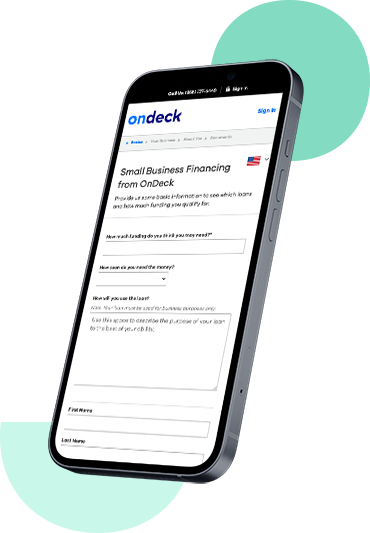
Business Line of Credit vs. Term Loan
Fast, flexible small business loans — get funding in as soon as 24 hours.†


TrustScore 4.6 | 4674 reviews

OnDeck offers two types of business funding — a line of credit and a term loan. Both options can provide small businesses with fast access to working capital. Our quick and easy online application can be completed in minutes. If approved, you can work with a U.S.-based loan advisor to choose the terms and funding amount that work best for you. After approval, you can get funds as soon as the same day.†
A revolving credit line you can draw from 24/7 to receive funds within seconds.*
A one-time lump sum of cash with an eventual option to apply for more.
Small business loans give you access to financing you can use to invest in your business. Whether you need additional working capital to grow, or you need to smooth out cash flow during the offseason, small business financing can help.
There are different types of business financing available. A term loan offers a lump sum of cash upfront that you can repay over time. A small business line of credit gives you access to a set credit limit that you can draw from as needed, and as you repay the funds become available to borrow again. Understanding your financing options can help you choose one that works for you and your needs.
To get a small business loan, you can apply with traditional lenders like banks and credit unions, or you can use an online lender that offers a fast application and quick decisions. To prepare, begin by gathering the necessary documents and researching minimum requirements.
The approval process will vary depending on the lender, but they’ll typically evaluate things like your credit score, time in business, revenue and other financial and business details to make a decision. Once approved, you will receive your funding and repay your loan according to your repayment schedule. A business loan calculator can help you estimate costs.
SBA loans are loans backed by the U.S. Small Business Administration. They’re offered through banks and other approved lenders and known for their competitive rates and long repayment terms.
These loans can be hard to qualify for and may come with additional paperwork and slower funding times. While OnDeck doesn’t offer SBA loans, they’re worth understanding if you’re comparing options.
| Feature | OnDeck | SBA Loans |
|---|---|---|
| Loan Amounts | 5K - $400K for term loan; $6K - $200K for line of credit. | $500 to $5.5 million, depending on the program. |
| Funding Time | Once approved, you may be able to get same-day funding.† | Varies. Generally 2 - 10 business days. |
| Minimum Credit Requirements | 625 personal FICO® score; $100K in business annual revenue.** | Not defined; need to demonstrate creditworthiness, ability to repay. |
| Repayment | Term loans repay daily or weekly over 6 - 24 months; Lines of credit repay weekly or monthly over 12, 18 or 24 month terms. | Microloans have a maximum of 7 year repayment terms; 504 and 7(a) loans can have repayment terms up to 25 years. |
| Collateral | Line of credit is unsecured; Term loans are secured with a general lien on the business. | None needed for loans up to $50K. It’s helpful but not required for larger loans. |
When it comes to small business financing, SBA loans are among the most popular and trusted options available. Understanding how these types of loans work and what you may be eligible for can help you find the right funding for your business.
The SBA works with lenders to offer several different types of loans for small business owners.
The 7(a) Loan Program is the SBA’s main business loan program. These loans can be for as much as $5 million and the funds can be used for a wide variety of business purposes. Borrowers can use these types of loans for working capital or to do things like purchase commercial real estate, equipment and more.
SBA Express loans are a part of the 7(a) program, but they are designed to offer a faster timeline. Certain qualified lenders can use their own processes to approve loans without a full review from the SBA — meaning borrowers can receive a decision faster. However, as a trade off, the loan amounts are smaller than a normal 7(a) loan.
SBA 504 loans are designed to support long-term investments that help fuel business development and job creation. They are available through non-profit organizations that partner with the SBA, called Certified Development Companies (CDCs). CDCs work to support local economic growth and help connect small businesses with funding that will fuel projects that fit community development goals.
Microloans are smaller loans designed for newer businesses, startups or those without much credit history. The typical microloan is around $13,000, but they can provide up to $50,000 in certain situations.
SBA loans typically require more paperwork than other funding options. You’ll need to complete detailed applications and provide a lot of financial documentation. You may also need to provide a business plan and outline how you’ll use the funds. The process can take several weeks and can vary depending on the lender.
To qualify for an SBA loan, you typically need to be a U.S.-based for-profit business. You’ll also need to meet SBA size standards and demonstrate that you couldn’t obtain similar business credit elsewhere.
Lenders that offer SBA-backed loans also have their own eligibility requirements. These can vary, but most look for a strong credit history, solid revenue and a certain amount of time in business. They may also ask you to provide collateral or a personal guarantee.
Complete the application.
Our streamlined loan application process is designed to be completed in just minutes.
Get a decision.
Work with an expert loan advisor to discuss eligibility and choose the best funding option for your business needs.
Receive your funds.
Sign your contract and get funds sent to your business bank account as soon as the same day.†

Chandra Franklin Womack, P.E.
Texas City, TX
Line of Credit Term Loan
“I got an amazing offer for a line of credit that would give me some flexibility for the future.”
Why Chandra chose funding from OnDeck:
1 Year
in business
Business
checking account
$100K
business annual revenue
625
personal FICO® score
Types of small business loans include term loans, lines of credit, merchant cash advances and equipment loans. There are many different types of business loans. Understanding your options can help you choose the one that fits your business. Some can help make major investments in business growth, some can help you level out cash flow during a slow season and others may be better suited for an entrepreneur just getting started.
Term loan. A business term loan provides funding for small businesses in a single lump sum. Maximum loan amounts typically exceed those offered by a line of credit or cash advance. Borrowers may repay a term loan through a regular schedule of daily, weekly or monthly payments. Term loans are typically used for big, one-time investments such as buying machinery, renovating a facility or large inventory purchases.
Line of credit. A business line of credit gives you access to a set amount of funding that you can draw from as needed. You only pay interest on the funds you use, and as you repay the balance, those funds become available to borrow again. Lines of credit are often used for ongoing working capital needs, such as managing cash flow, covering payroll or purchasing inventory.
Merchant cash advance. A merchant cash advance (MCA) provides businesses with lump-sum financing in exchange for a portion of future sales at a discount. Funding is often quick, but repayment can be expensive relative to other types of financing. Depending on the provider, repayment can be as a percentage of your debit and credit card sales or as a fixed scheduled payment (regardless of what your sales have been).
Equipment loan. Equipment loans are typically for purchases of machinery or work equipment, and are offered by many banks and online lenders. Typically, the purchased equipment serves as a form of specific collateral to secure the loan, which may allow the lenders to offer a more competitive interest rate than an unsecured loan. However, if the borrower defaults, the lender can repossess the purchased equipment. Standard business term loans can also be used to make equipment purchases.
OnDeck offers funding in as soon as 24 hours for qualified customers.† Timing depends on things like what time you apply and where you’re located. If you need capital quickly, applying early in the day can help speed things up.
Qualifying for a small business loan typically depends on several key factors, including your personal and business credit score, business revenue, time in business, and financial history. Most lenders look for a personal credit score of 650 or higher, at least 1 - 2 years in operation, and consistent cash flow to ensure you can repay the loan. You’ll also likely need to provide additional information with documentation such as tax returns, bank statements and sometimes a business plan.
The easiest small business loans to qualify for are usually online loans and lines of credit from alternative lenders, which often have more relaxed requirements than traditional lenders. Other types of business financing that can be more accessible for new businesses or those with lower credit scores include merchant cash advances, invoice factoring, and loans advertised as “business loans for bad credit” or “no credit check business loans.” However, these easier-to-get financing options may come with higher interest rates, shorter repayment terms and other risks, so it’s important to weigh convenience against cost.
Whether a small business loan is secured or unsecured depends on the lender and the loan itself. Many traditional banks and credit unions specialize in secured loans — though some may offer unsecured loans, too. Online lenders are better known for unsecured business loans, though many offer both.
With a secured loan, the borrower pledges collateral, such as property or liquid assets, in exchange for the loan. If the borrower defaults, the lender can take possession of the collateral to recoup losses on the loan. Unsecured loans don’t require collateral. This increases the risk to the lender, so interest rates for unsecured loans are typically higher than those for secured loans.
To provide flexibility, OnDeck’s term loan is secured with a general lien on business assets. This can help healthy businesses secure a small business loan, even if they don’t have specific collateral to offer. OnDeck’s line of credit is unsecured.
Small business loans can be installment (closed-end) credit or revolving (open-end) credit, depending on the financing option you choose. Term loans are installment credit, meaning you receive a lump sum up front that you can repay in smaller installments over time. Lines of credit are a form of revolving credit and work similarly to a credit card (though there are a few key differences). With a line of credit you’ll be given a credit limit that you can borrow up to. As you repay, the funds become available to borrow again.
Small business loans can be either fixed or variable, depending on the type of loan and the lender. Traditional term loans and many SBA loans often come with fixed interest rates, meaning your payment stays the same over the life of the loan. On the other hand, lines of credit and some alternative loans may have variable rates that fluctuate based on market conditions. Always check the loan terms carefully to understand whether your rate is fixed or variable and how it might affect your payments.
For more business resources and information on small business loans, check out these blog posts.